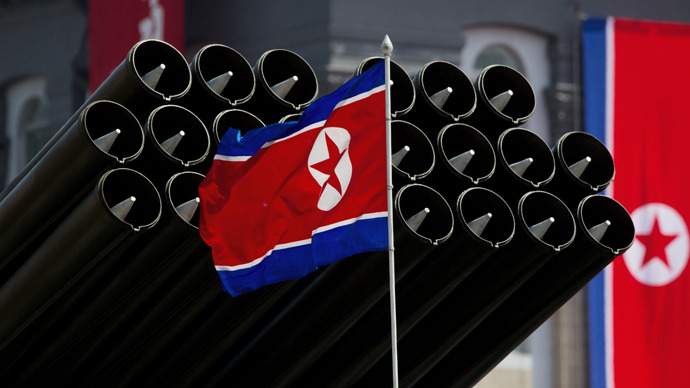'North Korea not a suicidal regime'

North Korea has reportedly moved its mid-range missiles within range of US bases in the Pacific. With US now starting a military buildup in the region, many fear the worst. But some experts believe the threat of war is avoidable.
The latest exchange of tit-for-tat military posturing and threats between the US and North Korea dates back to February, when following Pyongyang’s third missile test, the international community slapped its latest round of sanctions onto the regime.
This brought on more concrete action from the two countries, involving the deployment of stealth fighter jets, a warship and now a strengthening of the US military base in Guam – with North Korea now saying it has its top commanders’ final approval for a nuclear strike on US bases in the Pacific and South Korea.
RT has spoken to a number of experts on the prospect of the possible escalation of hostilities between Washington and Pyongyang. Their views all converge on one premise - that North Korea’s actions are testimony to the fact that they actually want to negotiate – not “commit national suicide”.
Co-Director of the ‘Foreign Policy In Focus’, John Feffer believes that at such a point in the dialogue between two nations hostile towards each other, the words of actors are not always rational and should not be understood as serious threats.
RT:North Korea recently moving long-range equipment to make it more in range of US bases in the Pacific: is it just blusters, is this gamesmanship, is this a real threat? What do you think?
JF: I think it’s just gamesmanship. North Korea is trying to get the US back to the negotiating table. And its missile range is frankly not reliable, nor long enough to make it to US positions.
RT:So, in terms of the concept of brinksmanship, how far do you think both sides are willing to ratchet up the tension before somebody finally takes a breath and says “All right, lets’ see what we can do here”?
JF: If these were two rational actors, I would say they should already have made the decision to back down. Unfortunately in a situation like this it’s not rationality that governs the actions of the players. They’re responding to, sometimes, unconscious queues, and sometimes to non-rational factors. But North Korea is not a suicidal regime. I don’t think that Kim Jong- un has demonstrated an interest in setting up a situation in which the US or South Korea simply eradicate his government. And of course the US isn’t particularly interested in any kind of a conflict at this point, especially with cuts going through in the military sector.
Danny Schechter, an independent film-maker and media critic echoes Feffer’s opinion, adding that, despite North Korea’s historic mistreatment of its people, there is a concerted effort at tarnishing its image and simplifying the reasons for its actions through media and Hollywood entertainment, and that the harmful effects of such a strategy make the public immune to analyzing Pyongyang’s actions in any kind of light but the one we are presented with by the United States.
RT:You’ve written about the so-called demonization of North Korea in the media. How is it being demonized?
DS: Well, there’s a new movie out, called ‘Olympus Has Fallen’… it’s about North Koreans invading the White House, taking the president hostage, shredding and trashing the whole place, killing and massacring all kinds of civilians. It’s the sort of movie that incites a violent response… these stereotypes end up contributing to a climate of tension. Just today, Anonymous [the hacker group] reportedly has stolen North Korean internet emails, so the conflict is broadening and widening into civil society.
RT:But it’s hardly surprising the whole world has turned on it, because it’s actually threatening to bomb the US with a nuclear bomb.
DS: I hate to tell you this, but what they’re actually saying and what we’re reading may be very, very different. PBS News Hour recently interviewed a member of the CIA who specializes in North Korea. He’s saying that actually the developments there are positive from an American point of view. The military is less involved, less engaged with the new government. There’s a promise and a possibility of a breakthrough there. So, I don’t think we’re just listening to our fears, our own voices based on stereotypes and historic reactions to the ‘nasty commies’ in North Korea. I think there’s something else going on here that we’re not seeing...This is a situation with historical roots which we need to understand.
RT:We’re not going to see a war, are we?
I think we’re going to see a war of words… there’s other stuff happening in North Korea that we don’t know, but perhaps we don’t want to know, because it’s more convenient as a faceless brutal enemy than as a possible partner in the region in a peninsula that’s still divided all these years later by war, dictatorship, the aftermath of WW2 etc. You have to get into the history and understand where they’re coming from if you want to talk to them and communicate with them and not just feel good about denouncing them.
The statements, views and opinions expressed in this column are solely those of the author and do not necessarily represent those of RT.












